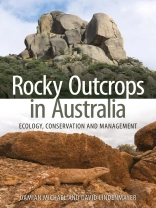Rocky outcrops are landscape features with disproportionately high biodiversity values relative to their size. They support specialised plants and animals, and a wide variety of endemic species. To Indigenous Australians, they are sacred places and provide valuable resources. Despite their ecological and cultural importance, many rocky outcrops and associated biota are threatened by agricultural and recreational activities, forestry and mining operations, invasive weeds, altered fire regimes and climate change.
Rocky Outcrops in Australia: Ecology, Conservation and Management contains chapters on why this habitat is important, the animals that live and depend on these formations, key threatening processes and how rocky outcrops can be managed to improve biodiversity conservation in agricultural landscapes, state forests and protected areas. This book will be an important reference for landholders, Landcare groups, naturalists interested in Australian wildlife and natural resource managers.
Recipient of the 2018 Whitley Certificate of Commendation for Landscape Zoology
Cuprins
Preface
Acknowledgements
Glossary
Chapter 1: Introduction and background
Chapter 2: Rocky outcrop values
Chapter 3: Australian rock-dwelling fauna
Chapter 4: Threatening processes
Chapter 5: Managing rocky outcrops for biodiversity conservation
Appendix 1: Australian rock-dwelling fauna and their conservation status
Index












